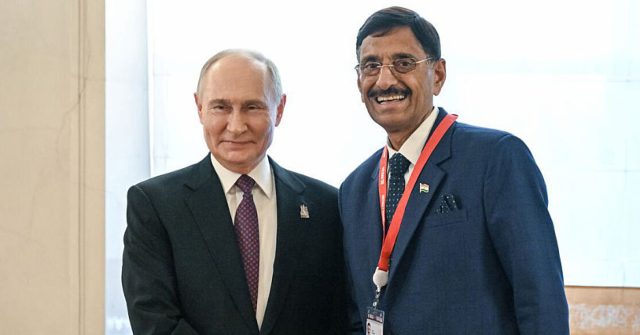Indian National Security Adviser Ajit Doval touted his government’s “strategic partnership” with Russia on Thursday after meeting with Russian military officials, while Prime Minister Narendra Modi vowed to keep shielding India’s agriculture industry with tariffs and regulatory barriers, despite President Donald Trump’s punitive tariffs on Indian goods.
Modi did not mention Trump or the United States by name in his remarks on Thursday, but vowed his government will “never compromise on the wellbeing of its farmers,” even if he must personally “pay a heavy price for it.”
“For us, our farmers’ welfare is supreme,” he said.
Agricultural protectionism and India’s purchases of Russian oil have emerged as the two biggest stumbling blocks to closing a trade deal with the United States. President Trump imposed a general 25 percent tariff on Indian goods on August 1, then added another 25 percent via executive order on Wednesday to penalize India for financing Russia’s war in Ukraine by purchasing huge amounts of Russian oil. The new 50 percent total rate is scheduled to take effect on August 27.
India has insisted its consumption of Russian oil will continue, although it has actually trimmed its imports from Russia quite a bit over the past few weeks, ostensibly because the discounts offered by Russian producers are getting smaller.
In a somewhat similar vein, even as Modi and other Indian politicians vow to protect domestic agriculture at all costs, India’s trade in agricultural products with the United States soared by almost 50 percent year-on-year in the first half of 2025.
The U.S. exports nuts, ethanol, soybean oil, and cotton to India, while India exports seafood, spices, oils, rice, fruits, vegetables, and baked goods to the United States. If the current pace of imports and exports holds up for the rest of the year, India will sell a total of $7.47 billion in agricultural products to the United States, and will buy a little over $3.5 billion in return.
President Trump often points to such lopsided trade imbalances as evidence of unfair competition, and his retaliatory tariffs are calculated to include the value of non-tariff regulatory barriers.
In the case of India, one of the tougher issues in trade negotiations has been that India will not import American ethanol for use as a fuel, which is one of its major intended purposes. Ethanol exports to India would presumably increase if this prohibition was removed. India also allows American producers to sell oils derived from beans and corn, but not the beans and corn themselves, and it also refuses to import genetically modified products.
Bloomberg News reported on Thursday that Indian officials are brainstorming other concessions they could offer Trump in the 21 days before the 50 percent tariff rate kicks in. One of those ideas is to relax India’s prohibition against importing genetically modified corn for use as animal feed.
Another point of contention is the Indian dairy market. India has very strict regulations on dairy imports, some of them flowing from Hindu dietary rules, such as a requirement that dairy cows cannot be fed animal products.
India also has sky-high tariffs on dairy imports, including 30 percent on cheese, 40 percent on butter, and 60 percent on milk powder. India is both the world’s largest producer and consumer of milk, with a dairy sector that employs over 80 million people. Indian officials state without apology that some of their rules and tariffs are intended to shield those jobs and keep milk prices high. Imports from America’s huge dairy industry would be almost guaranteed to drive prices lower.
Whatever they might be contemplating behind the scenes, or quietly offering with unheralded gestures like halting the flow of Russian oil to state-owned refineries, Indian officials and opposition leaders are publicly furious at Trump’s tariffs. The opposition has assailed Modi for considering a surrender to Trump’s “blackmail.”
Modi seems intent on preserving India’s relationship with Russia, and perhaps even moving further into Russia’s orbit, either to blunt the impact of Trump’s tariffs or intimidate the American president out of applying them.
After meeting with Russian Security Council secretary Sergei Shoigu in Moscow on Thursday, Modi’s national security adviser Ajit Doval praised the “very good relations” and “strategic partnership” between the two countries.
Doval said on Thursday that Russian President Vladimir Putin would be welcomed on a visit to India sometime in late 2025.
“We are committed to further active cooperation in order to form a new, more just and sustainable world order, ensure the supremacy of international law, and jointly combat modern challenges and threats,” Shoigu told Doval in return.
The “supremacy of international law” Shoigu mentioned was a criticism of Trump’s tariffs on India, not the international laws against countries launching brutal invasions of their neighbors. The Kremlin on Tuesday denounced Trump’s effort to pressure India into abandoning Russian oil as “illegal.”
“We believe that sovereign countries should have and do have the right to choose their own trading partners, partners for trade and economic cooperation, and to choose for themselves the forms of trade and economic cooperation that are in the interests of a particular country,” Kremlin spokesman Dmitry Peskov said on Tuesday.
Indian officials said Doval planned to discuss India’s cutback in Russian oil purchases while he was in Moscow, along with some long-delayed shipments of Russian surface-to-air missiles to India. India had purchased the bulk of its weapons from Russia until recently, when it began shifting more of its military acquisitions to Western suppliers.
Taken in tandem, Doval’s talks about oil and weapons suggest India is testing the waters for bigger deals with Russia, while also keeping its options open in U.S. trade negotiations — playing Moscow and Washington against each other to see which nation offers New Delhi a better deal.
Read the full article here


